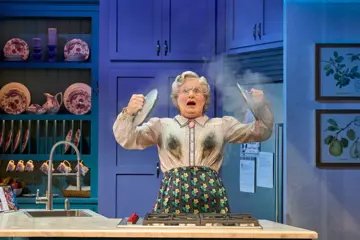 Jenny Hval
Jenny HvalSlumped underneath a desk in her Norwegian home, art pop singer-songwriter Jenny Hval charges her phone as we talk to ensure our line doesn't cut out. It's 8am on her end, the autumn Scandinavian sun already well-established in the sky. Her tone is high-pitched; soft and discreet. "It's pretty nice down here," she assures. "It's a nice morning today."
A strident, highly-dimensional artist, Hval is both a profound thinker and unique musical voice. Her existential musings hang atop a foundation of minimalistic avant-garde noise, both assuring and cataclysmic. Released in June this year on Sacred Bones Records, Hval's latest album Apocalypse, Girl (her first on the cult Brooklyn label) has augmented her burgeoning profile, introducing the eccentric Norwegian to a whole new audience.
Interestingly, Hval's artistic direction can be traced back to Australia, having spent two years studying the University of Melbourne's Creative Arts degree (sadly, now defunct). Her education down under stemmed from a sense of alienation in her home country, a sentiment which still manifests.
"What I deal with mostly is sexuality; I actually don't write much at all about sex."
"I never felt very at home in Scandinavia growing up, I had to go to Australia to find out what kind of music I wanted to pursue. I didn't have anyone I could see as my peers," she explains. "I was in the metal scene for a while actually, awkwardly standing on the edge of it. I'm probably an outsider here. I think my inspirations come from largely the English-speaking world, in many different parts of it, in many different ways."
Don't miss a beat with our FREE daily newsletter
Hval's approach has been termed "soft dick rock", a transgressive inverse of cock rock surveying gender and sexuality, both male and female, after a lyric on Apocalypse opener Kingsize. Her albums frequently grasp at conversations pertaining to the latter, a composite topic she feels is often misconstrued. 2011's Viscera opens with Hval detailing an electric toothbrush "pressed against [her] clitoris", while 2013 breakthrough Innocence Is Kinky commences with a similarly stirring statement: "At night, I watch people fucking on my computer".
"If there's one thing which tends to come up I don't think is very appropriate to my music, it's when people interpret sexuality as sex, which is a very common thing in our society," she says. "What I deal with mostly is sexuality; I actually don't write much at all about sex. There must be room for exploring sexuality and ways of being human that isn't just about the sex act. It's still something hard to separate when dealing with popular culture. I don't think there is such a thing as sexuality itself; it's infused in so much art and in the human spirit, that it comes with a side dish of everything else, always."
Consistent with the subversive "soft dick rock" tag, Hval is the antithesis to the fortitude and ostentation in the music industry; starkly honest, unafraid to present weakness. "Self-doubt, it's what I do," she croons on Apocalypse highlight Angels & Anaemia. Many musicians submit as the archetypal rock star, brash and buoyant. Hval, philosophical and peregrine, couldn't be less interested.
"[It's] unusual, self-doubt," she acknowledges, "especially when everything now is about being a strong 'whatever'. I feel wounded sometimes when I see an artwork following a strong character. I'm more interested in presenting doubt than something self-aware and self-assured. Seeing the vulnerability in situations where people are very vulnerable is something I really want to present."















